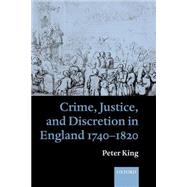Crime, Justice and Discretion in England 1740-1820
, by King, Peter- ISBN: 9780199259076 | 0199259070
- Cover: Paperback
- Copyright: 3/27/2003
The criminal law has often been seen as central to the rule of theeighteenth-century landed elite in England. This book presents a detailedanalysis of the judicial processs - of victims' reactions, pretrial practices,policing, magistrates hearings, trials, sentencing, pardoning and punishment -using property offenders as its main focus. The period 1740-1820 - the finalera before the coming of the new police and the repeal of the capital code -emerges as the great age of discretionary justice, and the book explores theimpact of the vast discretionary powers held by many social groups. Itreassesses both the relationship between crime rates and the economicdeprivation, and the many ways that vulnerability to prosecution varied widelyacross the lifecycle, in the light of the highly selective nature of pretrialnegotiations.More centrally, by asking at every stage - who used the law, for what purposes,in whose interests and with what social effects - it opens up a number of newperspectives on the role of the law in eighteenth-century social relations. Thelaw emerges as less the instrument of particular elite groups and more as anarena of struggle, of negotiation, and of compromise. Its rituals were lesscontrollable and its merciful moments less manageable and less exclusivelyavailable to the gentry elite than has been previously suggested. Justice wasvulnerable to power, but was also mobilised to constrain it. Despite the keyfunctions that the propertied fulfilled, courtroom crowds, the counter-theatreof the condemned, and the decisions of the victims from a very wide range ofbackgrounds had a role to play, and the criteria on which decisions were basedwere shaped as much by the broad and more humane discourse which Fielding calledthe 'good mind' as by the instrumental needs of the propertied elites.






